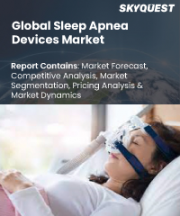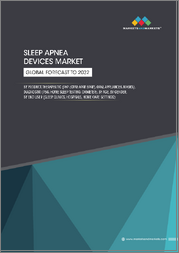
|
시장보고서
상품코드
1625015
수면무호흡용 디바이스 시장 규모 : 진단 디바이스별, 치료 디바이스별, 지역별, 범위 및 예측Global Sleep Apnea Devices Market Size By Diagnostic Devices, By Therapeutic Devices, By Geographic Scope And Forecast |
||||||
수면무호흡증 디바이스 시장 규모 및 전망
수면무호흡용 디바이스 시장 규모는 2023년 58억 달러로 평가되었고, 2024-2030년의 예측 기간 중 CAGR 6.5%로 성장하여 2030년에는 80억 달러에 달할 것으로 예상됩니다.
수면무호흡증 기기 세계 시장 성장 촉진요인
수면무호흡증 기기 시장 성장 촉진요인은 다양한 요인에 의해 영향을 받을 수 있습니다.
수면무호흡증 유병률 증가
중요한 요인 중 하나는 전 세계에서 수면무호흡증 발병률이 증가하고 있다는 점입니다. 좌식 생활습관, 비만, 고령화, 인식 및 진단의 향상 등 다양한 요인으로 인해 치료를 찾는 환자 수가 증가하고 있습니다.
기술 개발
보다 편안하고 효과적이며 사용하기 쉬운 수면무호흡증 치료 장비의 개발은 기술 발전의 산물입니다. 지속적 기도 양압기(CPAP) 장비, 구강내 장비 및 기타 장비의 디자인, 기능 및 연결이 개선되어 치료 결과와 환자 순응도가 향상되고 있습니다.
인지도 및 인지도 향상
치료받지 않은 수면무호흡증과 관련된 건강 위험에 대한 지식이 일반인과 의료 전문가 모두에게 널리 퍼지면서 진단율이 향상되었습니다. 수면무호흡증 진단을 받는 사람들이 늘어남에 따라 효율적인 치료 툴에 대한 필요성이 증가하고 있습니다.
의료비 지출 증가
첨단 수면무호흡증 치료 기기의 사용은 특히 선진국의 의료비 지출 증가로 인해 촉진되고 있습니다. 시장 성장은 수면무호흡증 치료에 대한 보험 적용 및 상환 가이드라인에도 영향을 받습니다.
재택의료 동향 :
수면무호흡증과 같은 만성질환을 집에서 관리하려는 추세에 따라 휴대가 간편하고 사용하기 쉬운 기기에 대한 수요가 증가하고 있습니다. 환자들은 일상 생활에 지장을 주지 않으면서 질병을 조절할 수 있는 최소 침습적 치료법을 선호합니다.
파트너십과 협업
첨단 수면무호흡증 치료 기기 개발은 주요 산업 참여자, 의료 서비스 프로바이더, 연구 기관 간의 파트너십과 협력에 의해 촉진됩니다. 이러한 협력 관계는 정보, 자원 및 기술 공유를 촉진하여 시장 확대를 촉진합니다.
정부 프로그램
수면무호흡증 치료 기기 시장은 수면장애를 대상으로 하는 정부 프로그램, 인식 개선 캠페인 지원, 의료 서비스 접근성 강화 등의 혜택을 받을 수 있습니다. 저렴한 기기의 개발 및 판매는 정책에 의해 지원되며, 이는 시장 확대에 기여할 것입니다.
고령 인구 증가
비만과 근력 저하로 인해 노인들은 수면무호흡증에 걸리기 쉽습니다. 노인 인구가 증가함에 따라 수면무호흡증 진단 및 치료 툴에 대한 수요가 증가할 것으로 예상됩니다.
세계의 수면무호흡용 디바이스 시장 성장 억제요인
수면무호흡증 기기 시장에는 몇 가지 요인이 억제요인 또는 과제로 작용할 수 있습니다.
고가의 비용
많은 수면무호흡증 치료기는 고가이기 때문에 특히 의료 접근성이 떨어지는 지역이나 보험이 충분하지 않은 환자들은 치료를 받지 못할 수 있습니다.
제한적인 상환 정책
특정 지역에서는 수면무호흡증 치료 장비의 비용이 보험으로 충분히 보장되지 않는 경우, 치료를 받으려는 환자가 경제적인 어려움에 직면할 수 있습니다.
인지도가 낮습니다.
환자나 의료진은 수면무호흡증에 대한 문제나 치료법에 대한 지식이 부족하여 오진이나 불충분한 치료를 받기도 합니다.
부작용
수면무호흡증용 장비를 사용할 때, 일부 환자들은 불편함이나 부작용을 느낄 수 있습니다. 여기에는 마스크 과민반응이나 지속적 양압호흡(CPAP) 요법에 대한 적응 장애 등이 포함됩니다.
컴플라이언스 문제
환자에 따라서는 불편함, 불편함, 수면 중 착용에 익숙하지 않음 등 다양한 이유로 치료 계획, 특히 CPAP 요법을 준수하는 데 어려움을 겪을 수 있습니다.
대체요법
외과적 시술이나 구강내 장비는 수면무호흡용 디바이스 시장과 경쟁할 수 있지만, 일부 사람들은 수면무호흡증 치료를 위해 이러한 대안적 접근 방식을 선호하거나 선택하기도 합니다.
규제상의 장애물
의료기기를 규제하는 법률이 엄격하여 수면무호흡증 치료법 개발 및 상품화에 소요되는 시간이 길어지고, 기술 혁신과 시장 개척이 저해될 수 있습니다.
보건의료 접근성 제한
전문 수면 클리닉이나 의료 서비스에 대한 접근성이 제한된 지역에서는 환자가 수면무호흡증에 대한 신속한 진단과 치료를 받는 데 어려움을 겪을 수 있으며, 이는 수면무호흡증 치료 기기에 대한 시장 수요에 영향을 미칠 수 있습니다.
목차
제1장 서론
- 시장의 정의
- 시장 세분화
- 조사 방법
제2장 개요
- 주요 조사 결과
- 시장 개요
- 시장 하이라이트
제3장 시장 개요
- 시장 규모와 성장의 가능성
- 시장 동향
- 시장 성장 촉진요인
- 시장 성장 억제요인
- 시장 기회
- Porter's Five Forces 분석
제4장 수면무호흡용 디바이스 시장 : 진단 디바이스별
- PSG(Polysomnography) 디바이스
- 재택 수면 검사(HST)용 디바이스
제5장 수면무호흡용 디바이스 시장 : 치료 디바이스별
- 기도양압(PAP) 디바이스
- 구강 어플라이언스
- 이식형 디바이스
제6장 지역별 분석
- 북미
- 미국
- 캐나다
- 멕시코
- 유럽
- 영국
- 독일
- 프랑스
- 이탈리아
- 아시아태평양
- 중국
- 일본
- 인도
- 호주
- 라틴아메리카
- 브라질
- 아르헨티나
- 칠레
- 중동 및 아프리카
- 남아프리카공화국
- 사우디아라비아
- 아랍에미리트
제7장 시장 역학
- 시장 성장 촉진요인
- 시장 성장 억제요인
- 시장 기회
- 시장에 대한 COVID-19의 영향
제8장 경쟁 구도
- 주요 기업
- 시장 점유율 분석
제9장 기업 개요
- ResMed Inc.
- Philips Respironics(a division of Royal Philips)
- Fisher & Paykel Healthcare
- SomnoMed
- BMC Medical Co.Ltd.
- Drive DeVilbiss Healthcare
- Braebon Medical Corporation
- Compumedics Limited
- Whole You Inc.(a subsidiary of Mitsui Chemicals, Inc.)
- Fisher Wallace
제10장 시장 전망과 기회
- 신규 기술
- 향후 시장 동향
- 투자 기회
제11장 부록
- 약어 리스트
- 전시와 참고 문헌
Sleep Apnea Devices Market Size And Forecast
Sleep Apnea Devices Market size was valued at USD 5.8 billion in 2023 and is projected to reach USD 8.0 billion by 2030 , growing at a CAGR of 6.5% during the forecast period 2024-2030. Global Sleep Apnea Devices Market Drivers The market drivers for the Sleep Apnea Devices Market can be influenced by various factors. These may include:
Growing Prevalence of Sleep Apnea
One important contributing factor is the increasing incidence of sleep apnea worldwide. The number of patients seeking therapy is rising due to a number of factors including sedentary lifestyles, obesity, aging populations, and improved awareness and diagnosis.
Technological Developments
The creation of more cozy, effective, and user-friendly sleep apnea equipment is the result of technological advancements. The design, functionality, and connection of continuous positive airway pressure (CPAP) machines, oral appliances, and other devices have improved, improving treatment outcomes and patient compliance.
Increasing Recognition and Recognition Rates
Higher rates of diagnosis have resulted from increased knowledge of the health dangers associated with untreated sleep apnea among both the general public and healthcare professionals. There is an increasing need for efficient treatment tools as more people receive sleep apnea diagnoses.
Growing Healthcare Expenditure
The use of sophisticated sleep apnea equipment is encouraged by rising healthcare spending, especially in industrialized nations. The market's growth is also influenced by insurance coverage and reimbursement guidelines for sleep apnea treatments.
Trend toward Home-based Care:
The need for portable, user-friendly equipment is being driven by the trend toward managing chronic illnesses, such as sleep apnea, at home. Patients like minimally invasive therapies that enable them to control their illness without interfering with their regular routines.
Partnerships and Collaborations
The creation of cutting-edge sleep apnea equipment is facilitated by partnerships and collaborations amongst major industry participants, healthcare providers, and research institutes. These collaborations promote market expansion by facilitating the sharing of information, resources, and technology.
Government programs
The market for sleep apnea devices may benefit from government programs that target sleep disorders, support awareness campaigns, and enhance access to healthcare services. The development and marketing of inexpensive devices are aided by policies, which also contribute to market expansion.
Growing Senior Population
Obesity and a loss of muscle tone make the elderly population more prone to sleep apnea. The need for tools to diagnose and treat sleep apnea is predicted to increase as the number of elderly people increases..
Global Sleep Apnea Devices Market Restraints
Several factors can act as restraints or challenges for the Sleep Apnea Devices Market. These may include:
Expensive Cost
A lot of sleep apnea devices can be pricey, which may prevent patients from getting them, particularly in areas with little access to healthcare or for those without sufficient insurance.
Limited Reimbursement Policies
Patients seeking treatment may face financial obstacles if their insurance does not sufficiently cover the cost of sleep apnea devices in specific areas.
Low Awareness
Patients and medical professionals may misdiagnose or undertreat sleep apnea as a result of a lack of knowledge regarding the problem and the available treatments.
Adverse Effects
When utilizing some sleep apnea devices, some patients may have discomfort or side effects. These include irritability from masks or trouble adjusting to continuous positive airway pressure (CPAP) therapy.
Problems with Compliance
Some patients may find it difficult to adhere to treatment plans, especially when it comes to CPAP therapy, for a variety of reasons, including discomfort, inconvenience, or trouble getting used to wearing the device while they sleep.
Alternative Therapies
While surgical procedures and oral appliances can compete with the market for sleep apnea devices, some individuals may prefer or choose these alternative approaches to treating their sleep apnea.
Regulatory Obstacles
Tight laws governing medical devices could lengthen the time it takes to develop and commercialize sleep apnea solutions, thereby impeding innovation and market expansion.
Restricted Access to Healthcare
Patients may encounter difficulties receiving a prompt diagnosis and treatment for sleep apnea in areas with limited access to specialized sleep clinics or healthcare services, which may affect the market demand for sleep apnea devices..
Global Sleep Apnea Devices Market Segmentation Analysis
The Global Sleep Apnea Devices Market is Segmented on the basis of By Diagnostic Devices, By Therapeutic Devices, and Geography.
By Diagnostic Devices
Polysomnography (PSG) devices
Devices that use polysomnography (PSG) are the gold standard for identifying sleep apnea. PSG tests entail spending the night in a sleep lab under continuous physiological monitoring.
Devices for home sleep testing (HST):
An easier and more affordable way to diagnose sleep apnea is with a HST device. They are usually used at home and are designed to monitor specific physiological functions..
By Therapeutic Devices
Positive Airway Pressure (PAP) devices
The most often used kind of treatment for sleep apnea is the use of PAP devices. They function by maintaining the airway open while you sleep by applying pressured air. Continuous positive airway pressure (CPAP), bilevel positive airway pressure (BiPAP), and auto-titrating positive airway pressure (APAP) are the three primary categories of PAP devices.
Oral Appliances
To help maintain the airway open while you sleep, oral appliances are a sort of mouthpiece. Although they are usually not as effective as PAP devices, they could be a suitable substitute for those who are unable to undergo PAP therapy.
Implantable Devices
Currently in development, implantable devices represent a novel approach to treating sleep apnea. The way these gadgets function is by stimulating the nerves that govern the tongue and throat muscles.
By Geography
North America:
Market conditions and demand in the United States, Canada, and Mexico.
Europe:
Analysis of the Sleep Apnea Devices Market in European countries.
Asia-Pacific:
Focusing on countries like China, India, Japan, South Korea, and others.
Middle East and Africa:
Examining market dynamics in the Middle East and African regions.
Latin America:
Covering market trends and developments in countries across Latin America.
Key Players
The major players in the Sleep Apnea Devices Market are:
ResMed Inc.
Philips Respironics (a division of Royal Philips)
Fisher & Paykel Healthcare
SomnoMed
BMC Medical Co.Ltd.
Drive DeVilbiss Healthcare
Braebon Medical Corporation
Compumedics Limited
Whole You Inc. (a subsidiary of Mitsui Chemicals.Inc.)
Fisher Wallace
TABLE OF CONTENTS
1. Introduction
- Market Definition
- Market Segmentation
- Research Methodology
2. Executive Summary
- Key Findings
- Market Overview
- Market Highlights
3. Market Overview
- Market Size and Growth Potential
- Market Trends
- Market Drivers
- Market Restraints
- Market Opportunities
- Porter's Five Forces Analysis
4. Sleep Apnea Devices Market, By Diagnostic Devices
- Polysomnography (PSG) devices
- Devices for home sleep testing (HST)
5. Sleep Apnea Devices Market, By Therapeutic Devices
- Positive Airway Pressure (PAP) devices
- Oral Appliances
- Implantable Devices
6. Regional Analysis
- North America
- United States
- Canada
- Mexico
- Europe
- United Kingdom
- Germany
- France
- Italy
- Asia-Pacific
- China
- Japan
- India
- Australia
- Latin America
- Brazil
- Argentina
- Chile
- Middle East and Africa
- South Africa
- Saudi Arabia
- UAE
7. Market Dynamics
- Market Drivers
- Market Restraints
- Market Opportunities
- Impact of COVID-19 on the Market
8. Competitive Landscape
- Key Players
- Market Share Analysis
9. Company Profiles
- ResMed Inc.
- Philips Respironics (a division of Royal Philips)
- Fisher & Paykel Healthcare
- SomnoMed
- BMC Medical Co.Ltd.
- Drive DeVilbiss Healthcare
- Braebon Medical Corporation
- Compumedics Limited
- Whole You Inc. (a subsidiary of Mitsui Chemicals, Inc.)
- Fisher Wallace
10. Market Outlook and Opportunities
- Emerging Technologies
- Future Market Trends
- Investment Opportunities
11. Appendix
- List of Abbreviations
- Sources and References



















